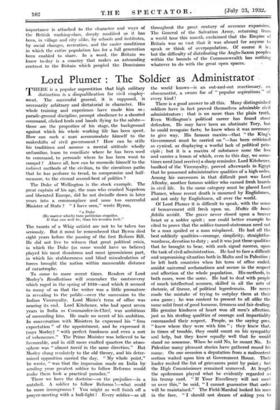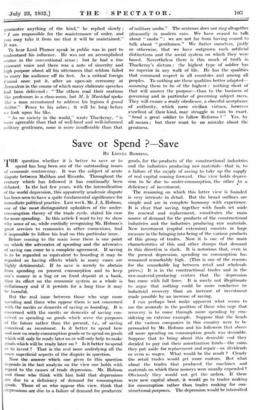Lord Plumer : The Soldier as Administrator T HERE is a
popular superstition that high military distinction is a disqualification for civil employ- ment. The successful general, it is supposed, is necessarily arbitrary and dictatorial in character. His whole training and experience have made him so ; parade-ground discipline, prompt obedience to a shouted command, clicked heels and hands flying to the salute— those are the properties of his stage, the background against which his whole • working life has been spent. How can such a- man accommodate himself to the makeshifts of civil government ? How can he stifle his traditions and assume a mental attitude wholly unfamiliar, learn to conciliate where he has been used to command, to persuade where he has been wont to compel ? Above all, how can he reconcile himself to the indirect methods of the civilian, to the circuitous paths that he has perforce to tread, to compromise and half- measure, to the eternal second-best of politics ?
The Duke of Wellington is the stock example. The great captain of his age, the man who crushed Napoleon and liberated Europe, did he not dwindle down in later years into a commonplace and none too successful Minister of State ? " I-have seen," wrote Byron,
"a Duke (No matter which) turn politician stupider, If that can well be, than his wooden look."
The taunts of a Whig satirist are not to be taken too seriously. But it must be remembered that Byron died eight years before the passing of the first Reform Bill. Ile did not live to witness that great political crisis, in which the Duke (as some would have us believe) played his most disastrous and most ignominious part, in which his stubbornness and blind miscalculation of forces brought the nation within measurable distance of catastrophe.
To come to more recent times. Readers of Lord Morley's Recolledione will remember the controversy which raged in the spring of 1910—and which it seemed to many of us that the writer was a little premature in revealing to the public—over the succession to the Indian Viceroyalty. Lord Minto's term of office was- nearing its end. Lord Kitchener, who had spent seven years in India as Commander-in-Chief, was ambitious of succeeding him. He made no secret of his ambition. - In conversation with Ministers he expressed his "firm expectation" of the appointment, and he expressed it (says Morley) with perfect frankness and even a sort of vehemence." The Prime Minister was believed to be favourable, and in still more exalted quarters the atmo- sphere was "almost torrid in the same direction." But Morley clung resolutely to the old theory, and his deter- mined opposition carried the day. "My whole point," he wrote, "was that the impression made on India by sending your greatest soldier to follow Reforms would make them look a practical paradox."
There we have the doctrine—or the prejudice—in a nutshell. A soldier to follow Reforms !—what could • be more incongruous ? You might as well finish off a prayer-meeting with a bull-fight ! Every soldier—as all the world knows—is an out-and-out reactionary, an obscurantist, a sworn foe of "popular aspirations" of every kind !
There is a good answer to all this. Many distinguished soldiers have in fact proved themselves admirable civil administrators : that is no more than the plain truth. Even Wellington's political career has found stout defenders. He may have been an obstinate Tory, but he could recognize facts; he knew when it was necessary to give way. His famous maxim—that "the King's Government must be carried on "—has been criticized as cynical, as displaying a woeful lack of political prin- ciple; but it is a maxim of substance none the less and carries a lesson of which, even to this day, we some- times need (and receive) a sharp reminder. Lord Kitchener, baulked of the Viceroyalty, proved afterwards in Egypt that he possessed administrative qualities of a high order. Among his successors in that difficult post was Lord Allenby, another famous soldier who earned -fresh laurels in civil life. In the same category must be placed Lord Plumer, whose recent death is mourned by Englishmen, and not only by Englishmen, all over the world.
Of Lord Plumer it is difficult to speak, with the sense of bereavement still fresh upon us. Mullis ilk bonis occidit. The grave never closed upon a braver heart or a nobler spirit ; nor could better example be cited to prove that the soldier-turned-statesman need not be a man spoiled or a man misplaced. He had all the best soldierly qualities—courage, simplicity, straightfor- wardness, devotion to duty ; and it was just these qualities that he brought to bear, with such signal success, upon the task of civil administration. He had to face a difficult and unpromising situation both in Malta and in Palestine ; he left both countries when his term of office ended, amidst universal acclamations and secure in the respect and affection of the whole population. His methods, in both cases, were the same. He had to deal with people of much intellectual acumen, skilled' in all the arts of rhetoric, of finesse, of political legerdemain. He never made the mistake of trying to outplay them at their own game ; he. was content to present to all alike the same solid front of good humour, firmness and fair dealing. His genuine kindness of heart won all men's affection, just as his sterling qualities of courage and impartiality commanded their respect. People, as the saying goes, " knew where they were with him " ; they knew that, in times of trouble, they could count on his sympathy and help, but they knew equally well that he would stand no nonsense. When he said No, he meant No. In Palestine many pleasant stories have gathered round his name.- On one occasion a deputation from a malcontent section waited upon him at Government House. Their leader recited the list of grievances point by point ; but the High Commissioner remained unmoved. At length the spokesman played what he evidently regarded as his trump card. "If Your Excellency will not meet us over this," he said, " I cannot guarantee that order will be maintained." The Field-Marshal looked his man in the face. "I should not dream of asking you to guarantee anything of the kind," he replied slowly; / am responsible for the maintenance of order, and you may take it from me that it will be maintained." It was.
To hear Lord Plumer speak in public was in part to understand his influence. He was not an accomplished orator - in- the conventional -.sense ; but he had a fine resonant voice and there was a note of sincerity and _high purpose about all his utterances that seldom failed to carry his audience off its feet. As a critical foreign Consul once ' put it, after an open-air ceremony at Jerusalem in the course of which many elaborate speeches .had been delivered : " The others read their orations like professors in a class-room, but 111. le Marge/aid spoke like a man accustomed to address his legions a grand theatre." - Peace to his ashes ; it will be long before we look upon 'his like.
"As no society in the world," wrote Thackeray, "is more agreeable than that of well-bred and well-informed military gentlemen, none is more insufferable than that of military snobs." • -The sentence does not ring altogethet pleasantly in modern ears. We have ceased to talk about " snobs " : we are not far from having ceased to talk about "gentlemen." We flatter ourselves, justly or otherwise, that we have outgrown such artificial distinctions and the social system on which they were based. Nevertheless there is this much of truth in Thackeray's dictum : the highest type of soldier has no superior in any walk of life. He has the qualities that .command respect in all countries and among all 'peoples. To nothing are these qualities better adapted— assuming them to be of the highest : nothing short of that will answer the purpose—than to the business of -governing and in particular of governing subject races. They will ensure a ready obedience, a cheerful acceptance of authority,, which mere civilian virtues, . however excellent of their kind, may struggle in vain to exact. ." Send a great soldier to follow Reforms ? " Yes, by -all means ; but there must be no mistake about the greatness.















































 Previous page
Previous page